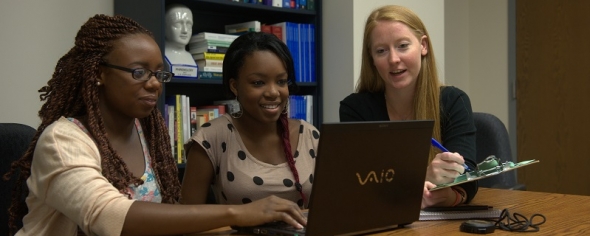Many undergraduate Psychology majors conduct research with faculty in their labs. We have several mechanisms that enable such research to take place, including the first experiences in research program, the directed research program, and the honors program.

Information about the directed research and honors programs
The directed research program is an opportunity for students to get involved with research under the supervision of a faculty member of the psychology department. Faculty from all of the research areas of our department participate in this program, as well as faculty who have primary appointments in other departments. This experience is particularly valuable for students interested in pursuing honors in psychology and/or graduate study in psychology. The list of opportunities is provided here. If you are interested in working with a particular faculty member who is not listed in the opportunities, feel free to contact that person directly!
Examples of undergraduate research
Below are a few examples of Psychology undergraduate honors theses.
| Taylor | Barber | Aidan Wright, Ph.D. | Borderline Personality Pathology and its Association with Risk for Cardiovascular Disease in Midlife |
| Franchessa | Bianconi | Elizabeth Votruba-Drzal, Ph.D. | The Persisting Screentime Gap: Parents' Role in Preschoolers' Screentime |
| Kaitlin | Bodnar | Ming-Te Wang, Ph.D. | Science Identity: Predicting Career Aspirations Across Gender and Race in Middle School Students |
| Miranda | Bridgwater | Gretchen Haas, Ph.D. | The Relationship Between Premorbid Adjustment and Emotional Intelligence in First-Episode Schizophrenia |
| Merete | Chaplin | Timothy Nokes-Malach, Ph.D. | The Dynamic Relationship between Feedback and Self-Efficacy in the Classroom Setting |
| Margaret | Fulcher | Jana Iverson, Ph.D. | How Mothers’ Speech is Influenced by Infant Gender, Age, Risk Status, and Motor Milestone Attainment |
| Emily | Hutchinson | Jennifer Silk, Ph.D. | Gaze Avoidance in Mother-daughter Dyads: The Effects of Depressive Symptoms and Parent-child Relationship Quality |
| Morgan | Lindenmuth | Erika Forbes, Ph.D. | Social and Non-social Stressors in the Neural Response to Reward and the Prediction of Future Depression in Adolescent Girls |
| Sarah | Markert | Jana Iverson, Ph.D. | Contingent Maternal Responses to Infant Pre-speech Vocalizations in Infants at High and Low Risk For Autism Spectrum Disorder |
| Alexis | Mattia | Aidan Wright, Ph.D. | Unpacking the Interrelationships Between Attachment, Emotion Regulation and Social Cognition and Their Impact on Borderline Personality Disorder |
| Anamiguel | Pomales | Mark Strauss, Ph.D. | A Visual Attention Based Measure of Receptive Language and Categorization in Typically Developing Toddlers and Toddlers at a Heightened Familial Risk for Autism Spectrum Disorder |
| Sarah | Probst | Celia Brownell, Ph.D. | From Feelings to Actions: The Effect of Emotion Understanding on Prosocial Behavior in Toddlers |
| Gabrielle | Russo | Timothy Nokes-Malach, Ph.D. | The Effects of Mindfulness on Emotion Regulation and Learning |
| Wesley | Starnes | Edward Orehek, Ph.D. | Endorsement of "Safe is Sexy": Regulatory Focus and Expectancy that Safer Sex is More Pleasurable |
| Eli | Talbert | Ming-Te Wang, Ph.D. | Differential Teaching Styles as an Indicator of Implicit Racial Bias |
| Taylor | Wulf | Jeffrey Cohn, Ph.D. | Nonverbal Indications of Acute Distress in Women with PTSD |